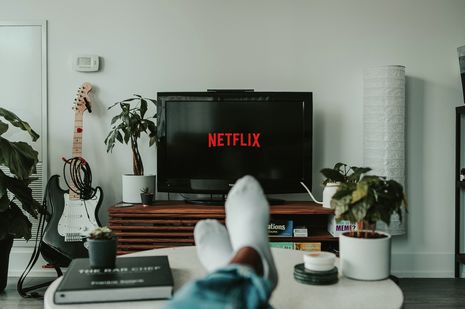Confessions of a Chronic Rewatcher
Esme Bishop loves knowing exactly what’s going to happen and when! In this article, she explores the psychology behind rewatching and how the film industry exploits it for lazy, financial gain

Autumn De Wilde’s adaptation of Jane Austen’s beloved novel Emma was released on the 14th February 2020. Now, almost three years on, I can safely say that I have watched it approaching a hundred times.
How could I possibly subject myself to the exact same thing over and over and over? Is it not monotonous? Does it not, somewhere along the line, lose its impact as a piece of art?
An observation I have made is that this world is made up of those who rewatch and those who don’t, or at least without a healthy chunk of months in between. A complaint I often receive from my family as we enter our inevitable Friday night doom-scroll and I dare to suggest we revisit Lady Bird or When Harry Met Sally is “we’ve already seen it!” The mere thought of repetition is met with animosity of the highest degree. Animosity that I’ll never understand because I feel no such inhibition. Of course I see the value of watching new things, for novelty’s sake or to expand your intellectual horizons. However, I am but a fragile being and, sometimes, that all feels a bit too much.
For what is novelty compared to reciting alongside Lady Bird’s Saoirse Ronan, with perfect timing, and in the exact cadence of her voice as she shouts: “YEAH WELL YOUR MOM’S TITS THEY ARE TOTALLY FAKE.” It’s unparalleled.
“Re-watching can often function as a form of emotional regulation through experiential control”
Much has been said about the psychology of rewatching and, once I got over the vicious personal attack these observations seemed to be suggesting, I must admit they make a lot of sense. Re-watching can often function as a form of emotional regulation through experiential control — you know exactly what’s going to happen, so it feels safe. If you have a brain that tends towards anxiety this may sound familiar. Rewatching is comforting because our emotions aren’t being forced into unfamiliar territory — even though I still sob every time I watch Lady Bird, it helps that I know exactly when I am going to cry. I’m familiar with the emotional journey I am going to take when I press play for the hundredth time, whereas there are certain films that have been on my watchlist for years that I can’t yet seem to force myself to watch, honestly out of fear of the emotional unknown.
It’s significantly easier to lose yourself in characters that you’re already familiar with, than to dive into a cast of anonymous faces. Much like when you get so comfortable with a certain friendship group that the very prospect of going to a different pub with new people becomes simply abhorrent. Watching a new movie is like freshers; nerve-wracking, exhausting, and you have no way of knowing if you’ll end up loving these new people or hating them, whether they’ll be friends for life or just those few hours you spend together in the Revs smoking area.
“Watching a new movie is like freshers; [...] you have no way of knowing if you’ll end up loving these new people or hating them”
Personally, I see no harm in this trait beyond mildly annoying your friends and family. But it is a trait that the industry, rather insidiously, seems to be increasing exploiting for the sake of good old fashioned financial gain. The type of films that get a wide theatrical release, and therefore make the most money, appear nowadays to be mostly reboots, franchises, and sequels. Think Disney’s influx of live action remakes of animated classics. Think the Marvel Cinematic Universe. To use the words of Martin Scorcese, “what’s not there is revelation, mystery or genuine emotional danger. Nothing is at risk.” They are safe bets to make money — but not necessarily art (necessarily! Don’t come for me, Marvel fans).
In turn, films that are less emotionally predictable but also truly remarkable are displaced. Avatar: The Way of Water and Aftersun were two 2022 releases. The former, a sequel to the highest grossing film of all time, was given a wide theatrical release and a mammoth publicity campaign, and it brought back $2,056,180,771. The latter, an independently produced and experimental directorial debut, despite being a completely astonishing and universally acclaimed feat, brought back only $3.2 million.
This is something that, as individuals, we unfortunately don’t have a whole lot of control over — me giving Emma a rest as my go-to comfort film certainly isn’t going to stop the reign of the MCU. But perhaps chronic re-watchers such as myself, next time we decide to go to the cinema and every inclination tells us to buy a ticket to Avatar or the Avengers, should ignore it and take a chance on the Aftersuns or the Everything Everywhere All At Onces. Because, who knows, the emotional danger just might be worth it. Every once in a while, a chat in the Revs smoking area does actually form the foundation of the most beautiful and extraordinary friendship.
 News / University Council rescinds University Centre membership20 February 2026
News / University Council rescinds University Centre membership20 February 2026 News / Hundreds of Cambridge academics demand vote on fate of vet course20 February 2026
News / Hundreds of Cambridge academics demand vote on fate of vet course20 February 2026 News / Judge Business School advisor resigns over Epstein and Andrew links18 February 2026
News / Judge Business School advisor resigns over Epstein and Andrew links18 February 2026 News / Union cancels event with Sri Lankan politician after Tamil societies express ‘profound outrage’20 February 2026
News / Union cancels event with Sri Lankan politician after Tamil societies express ‘profound outrage’20 February 2026 News / Caius students fail to pass Pride flag proposal20 February 2026
News / Caius students fail to pass Pride flag proposal20 February 2026










